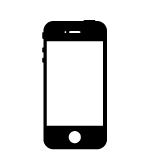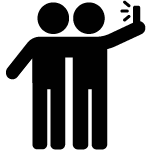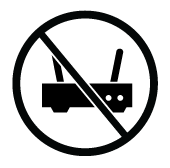Table of Contents
Table of Contents
Table of Contents
Large shares of Americans are connected to the world of digital information while “on the go” via smartphones and other mobile devices. Explore the patterns and trends that have shaped the mobile revolution below.
To better understand Americans’ smartphone and broadband adoption, Pew Research Center surveyed 5,733 U.S. adults from May 19 to Sept. 5, 2023. Ipsos conducted this National Public Opinion Reference Survey (NPORS) for the Center using address-based sampling and a multimode protocol that included both web and mail. This way nearly all U.S. adults have a chance of selection. The survey is weighted to be representative of the U.S. adult population by gender, race and ethnicity, education and other categories.
Polls from 2000 to 2021 were conducted via phone. For more on this mode shift, please read our Q&A.
Here are the questions used for this analysis, along with responses, and its methodology.

Mobile phone ownership over time
The vast majority of Americans – 97% – now own a cellphone of some kind. Nine-in-ten own a smartphone, up from just 35% in Pew Research Center’s first survey of smartphone ownership conducted in 2011.
| Year | Cellphone | Smartphone |
|---|---|---|
| 10/27/2002 | 62% | |
| 11/30/2004 | 65% | |
| 2/9/2005 | 66% | |
| 12/31/2005 | 67% | |
| 3/28/2006 | 66% | |
| 4/6/2006 | 73% | |
| 9/5/2007 | 76% | |
| 12/2/2007 | 75% | |
| 1/13/2008 | 77% | |
| 5/11/2008 | 78% | |
| 8/10/2008 | 82% | |
| 12/20/2008 | 84% | |
| 1/27/2009 | 85% | |
| 4/19/2009 | 85% | |
| 9/14/2009 | 84% | |
| 12/27/2009 | 83% | |
| 1/19/2010 | 80% | |
| 5/30/2010 | 82% | |
| 9/13/2010 | 85% | |
| 11/1/2010 | 84% | |
| 11/24/2010 | 82% | |
| 11/28/2010 | 82% | |
| 12/21/2010 | 81% | |
| 3/20/2011 | 86% | |
| 5/22/2011 | 83% | 35% |
| 8/26/2011 | 84% | |
| 12/21/2011 | 87% | |
| 1/8/2012 | 88% | |
| 1/15/2012 | 87% | 39% |
| 2/19/2012 | 88% | 45% |
| 4/3/2012 | 88% | 46% |
| 8/5/2012 | 87% | 44% |
| 8/7/2012 | 89% | |
| 9/6/2012 | 85% | 45% |
| 9/23/2012 | 88% | 43% |
| 9/30/2012 | 89% | |
| 10/14/2012 | 88% | |
| 11/4/2012 | 89% | |
| 11/10/2012 | 84% | 46% |
| 12/9/2012 | 87% | 45% |
| 12/16/2012 | 88% | |
| 1/6/2013 | 89% | 51% |
| 5/19/2013 | 91% | 56% |
| 7/14/2013 | 90% | 53% |
| 7/28/2013 | 91% | 53% |
| 9/16/2013 | 89% | 54% |
| 9/30/2013 | 91% | 55% |
| 10/6/2013 | 92% | 58% |
| 1/5/2014 | 92% | 55% |
| 1/12/2014 | 90% | 58% |
| 1/26/2014 | 91% | 55% |
| 2/18/2014 | 90% | |
| 4/27/2014 | 92% | |
| 9/21/2014 | 91% | |
| 12/21/2014 | 89% | 59% |
| 4/12/2015 | 92% | 67% |
| 7/12/2015 | 92% | 68% |
| 11/15/2015 | 91% | 69% |
| 4/4/2016 | 92% | 72% |
| 5/3/2016 | 92% | 70% |
| 11/6/2016 | 95% | 77% |
| 1/10/2018 | 95% | 77% |
| 2/7/2019 | 96% | 81% |
| 2/8/2021 | 97% | 85% |
| 9/5/2023 | 97% | 90% |

Who owns cellphones and smartphones?
Substantial majorities of Americans across a wide range of demographic groups are cellphone owners. The same is true for smartphone ownership – though some differences do emerge, particularly by age, household income and level of formal education.
% of U.S. adults who say they own a __, by …
| Ages 18-29 | 30-49 | 50-64 | 65+ | |
|---|---|---|---|---|
| Cellphone | 99 | 99 | 98 | 94 |
| Smartphone | 97 | 97 | 89 | 76 |
| Cellphone, but not smartphone | 1 | 2 | 8 | 17 |
Source: Survey of U.S. adults conducted May 19-Sept. 5, 2023.
| Men | Women | |
|---|---|---|
| Cellphone | 97 | 97 |
| Smartphone | 91 | 90 |
| Cellphone, but not smartphone | 6 | 7 |
Source: Survey of U.S. adults conducted May 19-Sept. 5, 2023.
| White | Black | Hispanic | Asian* | |
|---|---|---|---|---|
| Cellphone | 97 | 96 | 98 | 99 |
| Smartphone | 91 | 84 | 91 | 97 |
| Cellphone, but not smartphone | 6 | 12 | 6 | 2 |
Note: White, Black and Asian adults include those who report being only one race and are not Hispanic. Hispanics are of any race. Respondents who did not give an answer are not shown.
Source: Survey of U.S. adults conducted May 19-Sept. 5, 2023.
| High school or less | Some college | College graduate+ | |
|---|---|---|---|
| Cellphone | 95 | 98 | 99 |
| Smartphone | 83 | 92 | 97 |
| Cellphone, but not smartphone | 12 | 5 | 2 |
Source: Survey of U.S. adults conducted May 19-Sept. 5, 2023.
| Urban | Suburban | Rural | |
|---|---|---|---|
| Cellphone | 97 | 98 | 97 |
| Smartphone | 91 | 93 | 87 |
| Cellphone, but not smartphone | 6 | 5 | 10 |
Source: Survey of U.S. adults conducted May 19-Sept. 5, 2023.
| Rep/Lean Rep | Dem/Lean Dem | |
|---|---|---|
| Cellphone | 97 | 98 |
| Smartphone | 92 | 91 |
| Cellphone, but not smartphone | 6 | 7 |
Source: Survey of U.S. adults conducted May 19-Sept. 5, 2023.

Smartphone dependency over time
Today, 15% of U.S. adults are “smartphone-only” internet users – meaning they own a smartphone, but do not have home broadband service.
| U.S. adults | |
|---|---|
| 2013 | 8% |
| 2015 | 13% |
| 2016 | 12% |
| 2018 | 20% |
| 2019 | 17% |
| 2021 | 15% |
| 2023 | 15% |

Who is smartphone dependent?
Reliance on smartphones for online access is especially common among Americans with lower household incomes and those with lower levels of formal education.
| Ages 18-29 | 30-49 | 50-64 | 65+ | |
|---|---|---|---|---|
| 2013 | 12% | 9% | 7% | 3% |
| 2015 | 19% | 16% | 11% | 7% |
| 2016 | 17% | 13% | 11% | 7% |
| 2018 | 28% | 24% | 16% | 10% |
| 2019 | 22% | 18% | 14% | 12% |
| 2021 | 28% | 11% | 13% | 12% |
| 2023 | 20% | 11% | 14% | 16% |
| White | Black | Hispanic | Asian* | |
|---|---|---|---|---|
| 2013 | 6% | 10% | 16% | |
| 2015 | 10% | 19% | 23% | |
| 2016 | 9% | 15% | 23% | |
| 2018 | 14% | 24% | 35% | |
| 2019 | 12% | 23% | 25% | |
| 2021 | 12% | 17% | 25% | |
| 2023 | 12% | 21% | 20% | 14% |
| Men | Women | |
|---|---|---|
| 2013 | 9% | 8% |
| 2015 | 14% | 13% |
| 2016 | 12% | 12% |
| 2018 | 20% | 19% |
| 2019 | 17% | 16% |
| 2021 | 14% | 15% |
| 2023 | 15% | 14% |
| Less than $30,000 | $30,000- $49,999 | $50,000- $74,999 | $75,000+ | Less than $30,000 (NPORS) | $30,000- $69,999 (NPORS) | $70,000- $99,999 (NPORS) | $100,000+ (NPORS) | |
|---|---|---|---|---|---|---|---|---|
| 2013 | 12% | 9% | 5% | 5% | ||||
| 2015 | 20% | 15% | 10% | 6% | ||||
| 2016 | 21% | 12% | 10% | 5% | ||||
| 2018 | 31% | 22% | 14% | 9% | ||||
| 2019 | 26% | 20% | 10% | 6% | ||||
| 2021 | 27% | 19% | 6% | 6% | ||||
| 2023 | 28% | 19% | 9% | 4% |
| Year | Less than high school graduate | High school graduate | High school or less | Some college | College graduate |
|---|---|---|---|---|---|
| 2013 | 14% | 11% | 8% | 4% | |
| 2015 | 21% | 17% | 14% | 6% | |
| 2016 | 27% | 15% | 12% | 5% | |
| 2018 | 39% | 22% | 21% | 10% | |
| 2019 | 32% | 24% | 16% | 4% | |
| 2021 | 23% | 15% | 4% | ||
| 2023 | 24% | 13% | 6% |
| Urban | Suburban | Rural | |
|---|---|---|---|
| 2013 | 9% | 7% | 9% |
| 2015 | 15% | 12% | 15% |
| 2016 | 12% | 12% | 14% |
| 2018 | 22% | 17% | 17% |
| 2019 | 17% | 13% | 20% |
| 2021 | 16% | 12% | 17% |
| 2023 | 17% | 11% | 18% |

Find out more
This fact sheet was compiled by Research Assistant Olivia Sidoti, with help from Research Analyst Risa Gelles-Watnick, Research Analyst Michelle Faverio, Digital Producer Sara Atske, Associate Information Graphics Designer Kaitlyn Radde and Temporary Researcher Eugenie Park.
Follow these links for more in-depth analysis of the impact of mobile technology on American life.
- Americans’ Social Media Use Jan. 31, 2024
- Americans’ Use of Mobile Technology and Home Broadband Jan. 31 2024
- Q&A: How and why we’re changing the way we study tech adoption Jan. 31, 2024
Find more reports and blog posts related to internet and technology.